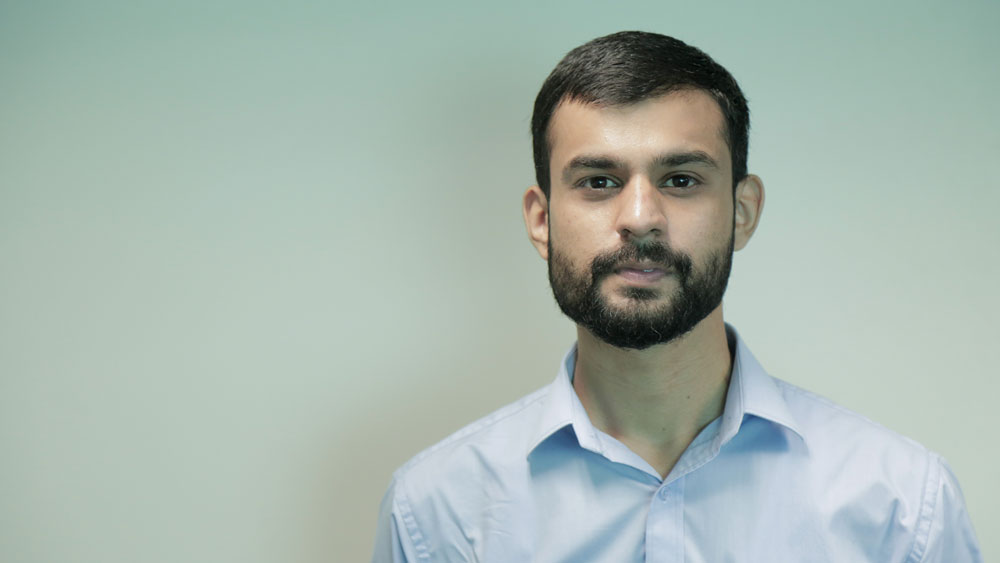
Umer Farooq is a first-year graduate student in the Doctor of Philosophy in Interdisciplinary Engineering program in the Department of Multidisciplinary Engineering at Texas A&M University. |
Image: Courtesy of Umer Farooq
Umer Farooq is pursuing a doctorate in interdisciplinary engineering in the Department of Multidisciplinary Engineering and was recently awarded the 2023-24 Teaching as Research Fellowship (TAR) by the Center for the Integration of Research, Teaching and Learning at Texas A&M University (CIRTL@TAMU). CIRTL's mission is to enhance excellence in STEM education through instructor development.
Farooq hails from Pakistan, where he received a bachelor's degree in electrical engineering and a master's degree in computer engineering. Before he arrived at Texas A&M University this spring, he worked as a teaching fellow at Information Technology University in Punjab, Pakistan.
His current research involves active learning in engineering education. He focuses on integrating diverse perspectives and approaches to address challenges requiring more than one engineering discipline.
"The driving factor for me to pursue interdisciplinary engineering was the ability to apply knowledge and methods from multiple engineering disciplines to solve complex problems," Farooq said.
Farooq submitted a proposal stating his research goals during the application process. He cites his teaching experience and research on active learning inclusion in engineering classrooms as paving the path to this fellowship.
"It's validating to have this recognition of my current work and the work I did in my professional career before starting this doctorate at Texas A&M," said Farooq. "It's particularly meaningful to me because this comes from respected authorities and institutions that focus on teaching excellence."
He looks forward to connecting with other fellows, mentors and like-minded professionals. During this TAR fellowship, Farooq will teach STEM subjects — including robotics, digital logic designing and computer programming — and incorporate active learning using the Interactive Constructive Active Passive (ICAP) framework. ICAP comprises four modes of cognitive engagement during education: interactive, constructive, active and passive.
This framework refers to passive learning, such as listening to lectures, and active learning, when students learn new information and participate in the learning process by applying that knowledge through critical thinking. This then leads to constructive learning (asking questions, etc.) and interactive learning (responding and collaborating with other students). Classes designed with this framework allow students to utilize their cognition levels effectively when they become active, constructive and interactive.
"This fellowship can provide me access to educational opportunities that may not have been available otherwise," Farooq said. "I believe this journey throughout my fellowship will contribute to my intellectual growth and make me more competitive in research."
Farooq hails from Pakistan, where he received a bachelor's degree in electrical engineering and a master's degree in computer engineering. Before he arrived at Texas A&M University this spring, he worked as a teaching fellow at Information Technology University in Punjab, Pakistan.
His current research involves active learning in engineering education. He focuses on integrating diverse perspectives and approaches to address challenges requiring more than one engineering discipline.
"The driving factor for me to pursue interdisciplinary engineering was the ability to apply knowledge and methods from multiple engineering disciplines to solve complex problems," Farooq said.
Farooq submitted a proposal stating his research goals during the application process. He cites his teaching experience and research on active learning inclusion in engineering classrooms as paving the path to this fellowship.
"It's validating to have this recognition of my current work and the work I did in my professional career before starting this doctorate at Texas A&M," said Farooq. "It's particularly meaningful to me because this comes from respected authorities and institutions that focus on teaching excellence."
He looks forward to connecting with other fellows, mentors and like-minded professionals. During this TAR fellowship, Farooq will teach STEM subjects — including robotics, digital logic designing and computer programming — and incorporate active learning using the Interactive Constructive Active Passive (ICAP) framework. ICAP comprises four modes of cognitive engagement during education: interactive, constructive, active and passive.
This framework refers to passive learning, such as listening to lectures, and active learning, when students learn new information and participate in the learning process by applying that knowledge through critical thinking. This then leads to constructive learning (asking questions, etc.) and interactive learning (responding and collaborating with other students). Classes designed with this framework allow students to utilize their cognition levels effectively when they become active, constructive and interactive.
"This fellowship can provide me access to educational opportunities that may not have been available otherwise," Farooq said. "I believe this journey throughout my fellowship will contribute to my intellectual growth and make me more competitive in research."